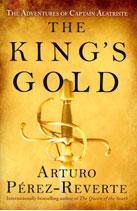

Дата отгрузки на данный момент неизвестна.
Товар закончился у основного поставщика, и, после получения заказа от вас, мы закажем его у других поставщиков. Мы не можем гарантировать выполнение данного заказа, поэтому настоятельно не рекомендуем заказывать данный товар, используя предоплату (банковский перевод и т.п.). Заказ на такой товар действителен в течение 3 недель (если в течение 3 недель товар не придет, заказ будет отменен). Однако, это не означает, что товар нельзя заказать вновь, поскольку в некоторых случаях возможны и более поздние поставки.
Технические характеристики
"The fourth novel in the immensely satisfying Captain Alatriste series by Arturo Pérez-Reverte opens with a Spanish galleon sailing into a home port that is festooned with English corpses. The slain enemies, fruit of a failed Anglo-Dutch attack on Cádiz, `hung from gallows erected on the shore, along the edge of the bunches of grapes ripe for harvesting, except that these grapes had been harvested already`. Such carnage is a welcome sight to Spanish eyes in 1626, even eyes as jaded as those of our hero, Alatriste. For us, though, the scene is unsettling. Instead of action, we find action`s putrefied aftermath. The tone is not triumphant but exhausted. Alatriste, his young protégé Ínigo and his battered comrades are tired of adventures. But they need another one that pays well. An air of cynical resignation pervades The King`s Gold. Pérez-Reverte, even as he stages exhilarating scenes, darkens the mood, making this novel one of his finest. `War is at least clean`, Alatriste observes, whereas the business of empire is extremely grubby. The gold at the center of this novel has been smuggled from the West Indies and is destined not for King Philip`s treasury but for `private pockets`, perhaps even for the coffers of Spain`s enemies. Pérez-Reverte succinctly explains the political and economic background, which we discover along with Alatriste as he learns the details of his mission: to recover the king`s treasure from a ship off Seville. Not for glory or patriotism - both sullied terms in Alatriste`s world - but for the gold itself. `Spain is going to the dogs`, a courtier reflects. `Everyone steals, cheats, and lies and no one pays his debts`. Except for Alatriste, whose dented moral compass still steers him toward loyalty and a man`s word`. Since there were no old gods in whom one could trust`, Ínigo observes, `no great words that could be bandied about during combat, it was a salve to everyone`s honor - or, at least, better than nothing at all - to have a king for whom one could fight.` A wistful narrator, Ínigo recalls not only their daring escapades but also his youthful self, hopelessly in love with the manipulative Angelica. Even stock scenes of romantic assignation, swordplay, torture and execution appear fresh and profound in these pages, tinged as they are with longing for a time that never was as glorious as other swashbucklers would have us believe".